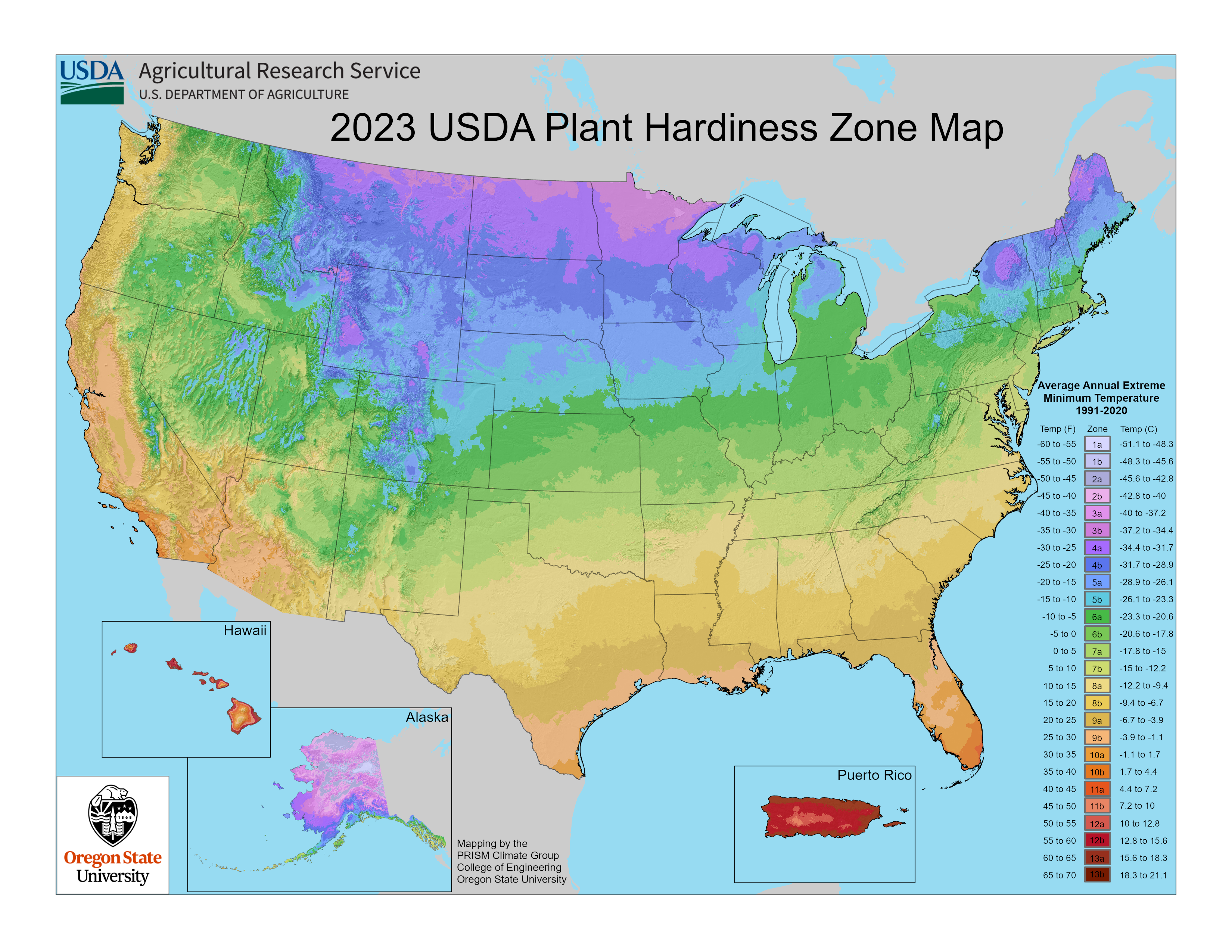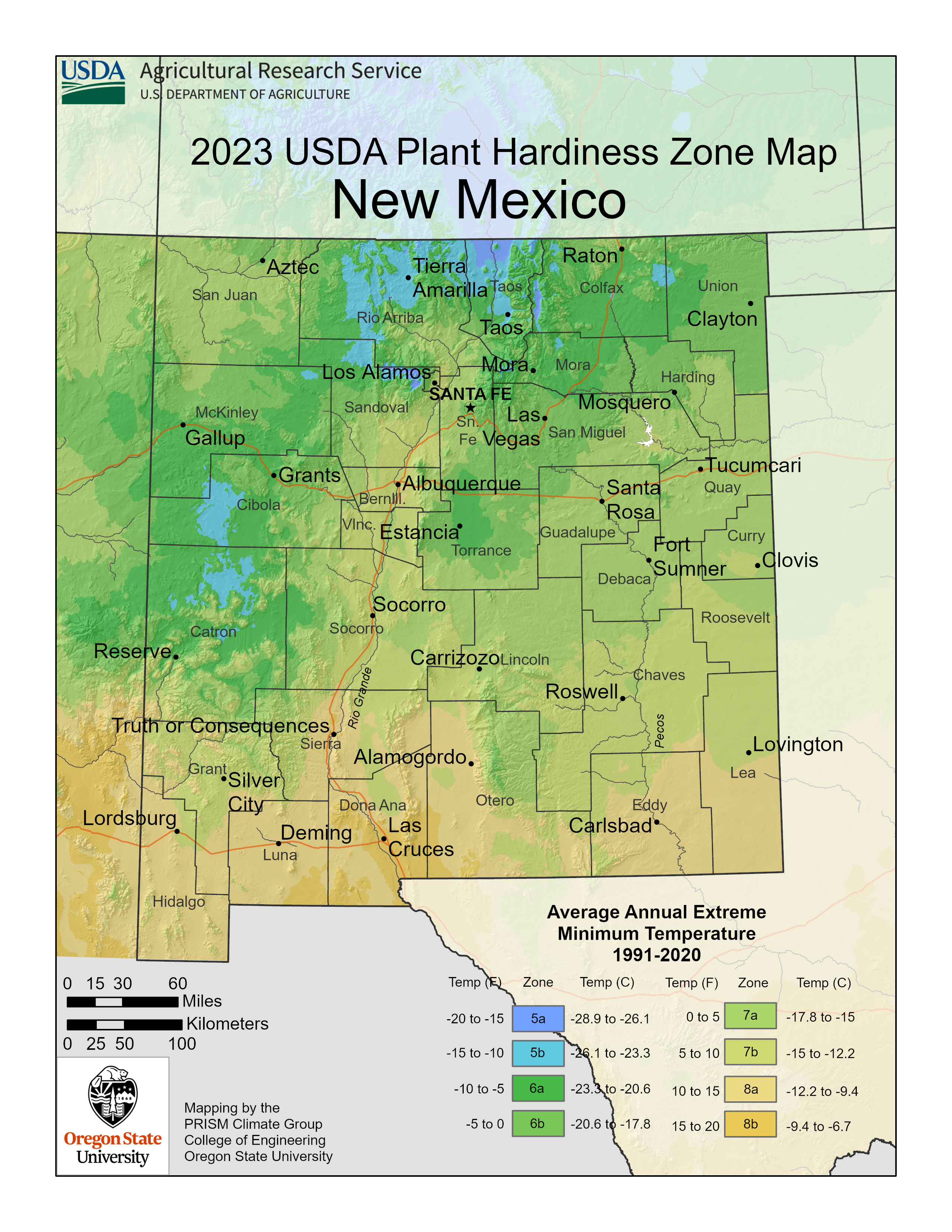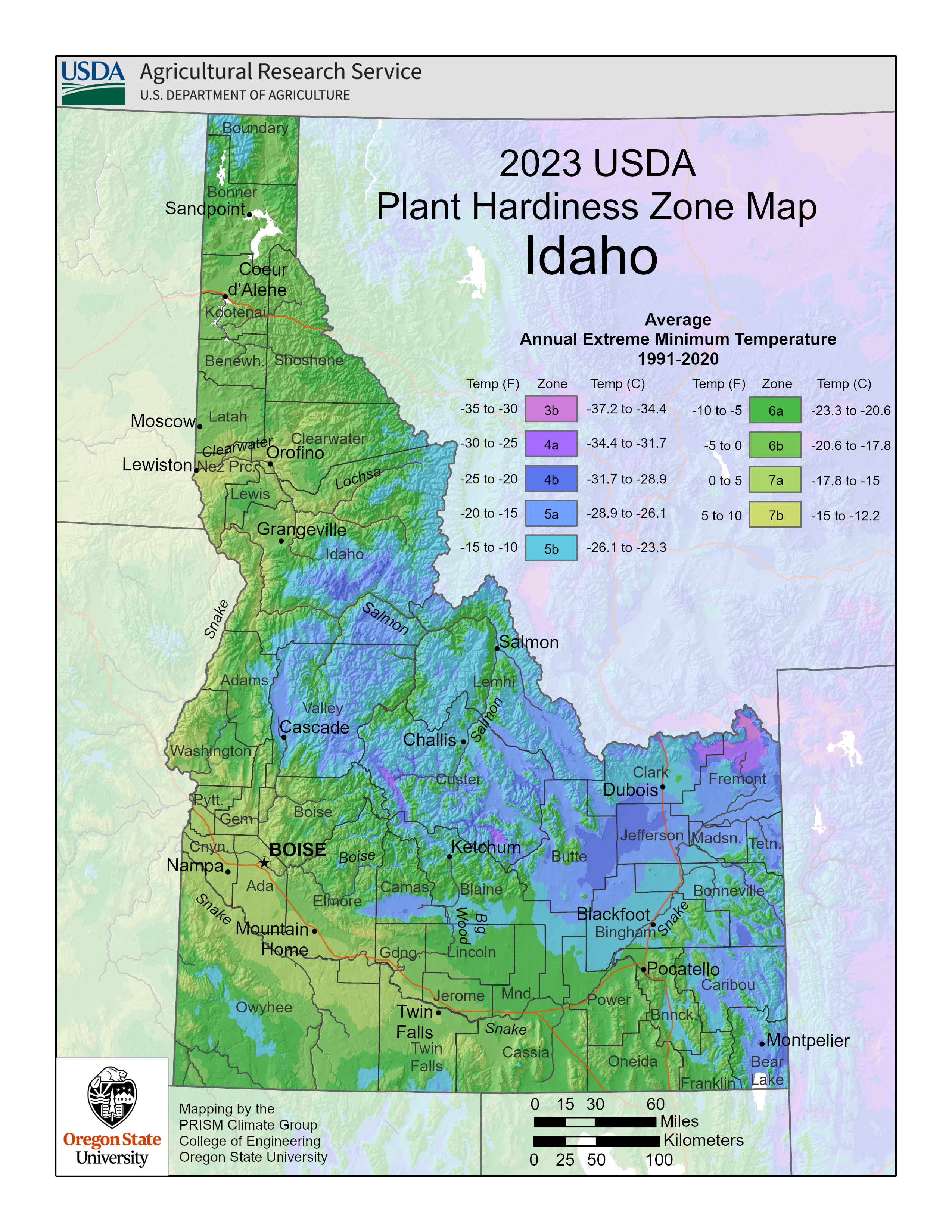When you drive around your neighborhood, you can’t help but notice other people’s lawns and how yours compares.
The most common thing that homeowners look at is how green the grass is. After all, the greener the grass, the healthier the lawn, right?
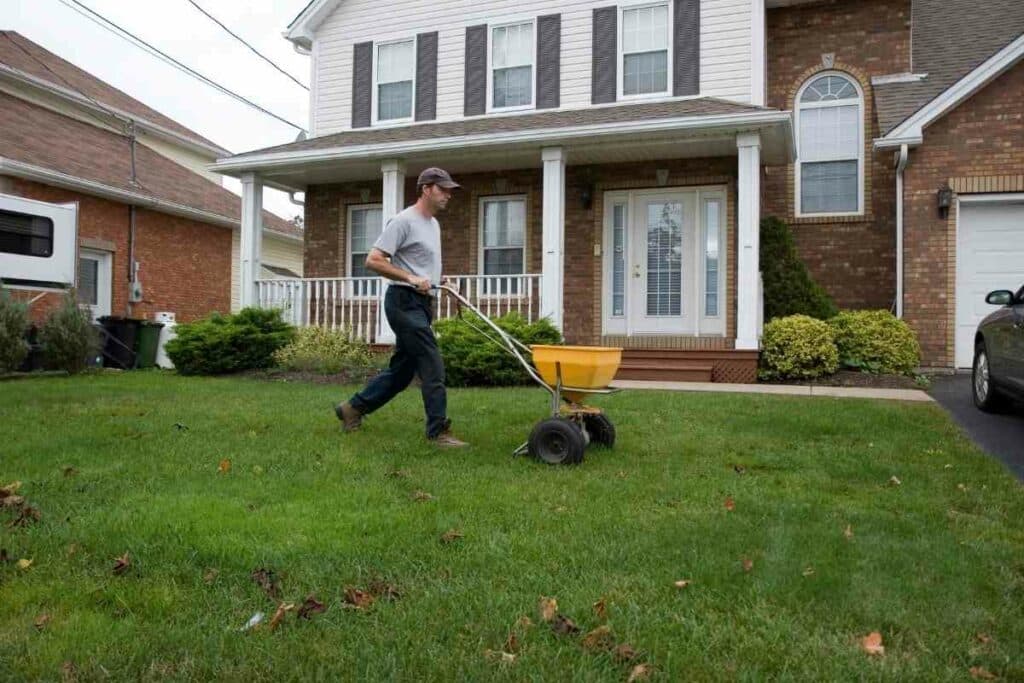
So, if you don’t want to be green with envy over your neighbors’ lawns, you need to be looking for a way to nourish it.
In an ideal world, water and sunshine would be enough to make our lawns luscious and green. However, it’s not always that easy.
Sometimes – Our gardens need a little bit of extra help. If you think the grass is greener at your neighbor’s place, maybe they’ve got a little trick up their sleeve.
Ironite – What is it?
Ironite is essentially an iron supplement for grass, as its name suggests.
Using it on your lawn helps it to turn a deep green color by nourishing it.
Ironite is versatile and works well in pretty much any soil type even if your lawn area includes other plants such as trees and shrubs.
Putting Ironite on your lawn adds the right amount of essential nutrients and reduces the need for watering as much.
Using Ironite on plants such as vegetables and roses will also help turn its foliage a healthy, green color.
Iron helps in the photosynthesis process, which is how plants turn energy from the sun into their food. It is a micronutrient needed to make chlorophyll – the substance that makes plants green!
Ironite – As you’ve learned, has a high iron content, so it speeds up this natural process, giving it a boost. However, there are different kinds of Ironite formulae that include other nutrients such as nitrogen, potassium and manganese, all of which have other benefits.
Ironite generally comes in two forms:
- granular Ironite
- liquid Ironite
Let’s have a look at the differences between the two.
Liquid Ironite for your lawn
Liquid Ironite works best in sandy and alkaline soils.
This is because these soils are loose and are well-known for letting lawn fertilizers wash straight past the grassroots as soon as it rains.
By using liquid Ironite, the grass blades can also absorb the Ironite themselves, so you’re not relying solely on root absorption.
Also, if you want to give your lawn a ‘quick fix’, liquid Ironite tends to work quicker given its easier absorption by the grassroots.
However, liquid Ironite causes permanent staining to stonework and paving – so take care!
Granular Ironite for your lawn
Granular Ironite can be spread straight onto the soil.
After it’s applied, you water the lawn immediately to help the granules stick to the soil and work themselves into the turf.
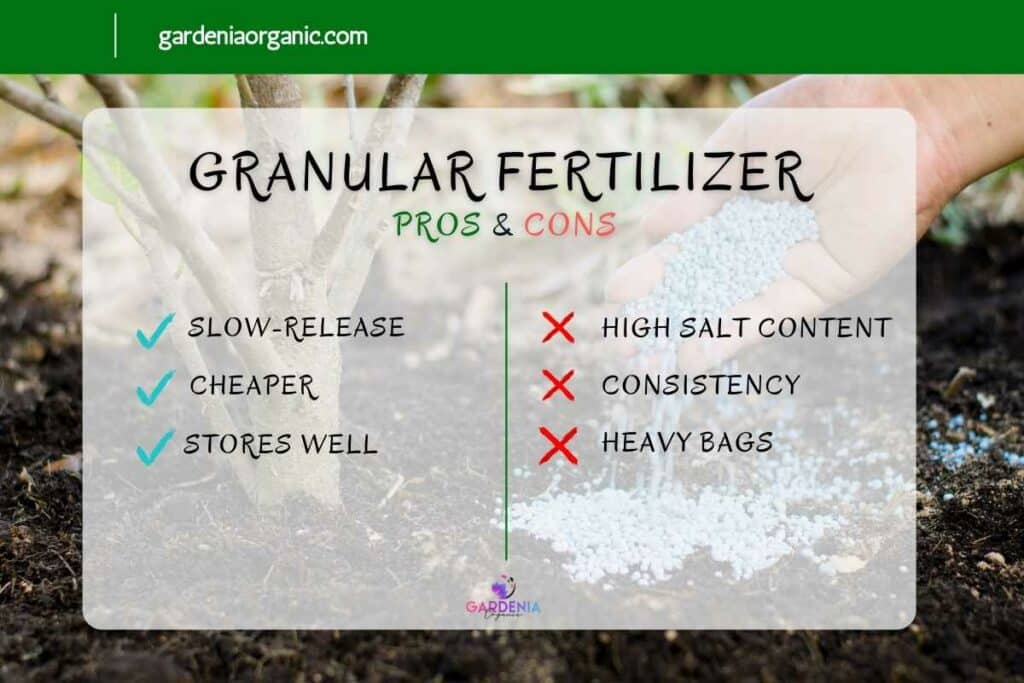
If you have a regular lawn with no soil issues or a lawn growing on clay soil, granular Ironite is a great choice.
You can also mix granular Ironite with another granular product such as a slow-release fertilizer and kill two birds with one stone.
Granular Ironite tends to be cheaper than liquid. It is easy to apply all year round and can be applied no matter the weather conditions.
It’s a slower-release form of Ironite in comparison to liquid types. However, it also can be tricky to apply evenly in comparison with the liquid variety.
How much Ironite should you apply?
Historically, the best application rate for Ironite is one pound for every 100 square feet of lawn.
However, the Ironite formula has been altered recently. The instructions for granular Ironite now say that 1/3 of a pound should be applied per 100 square feet.
For those who use a measuring cup before adding Ironite to a spreader, ½ a cup of Ironite is approximately 1/3 of a pound in weight.
If you have a lawn that measures 1,000 square feet, you should use five cups of Ironite in total.
Make sure you adjust the settings on a spreader if you use one so that you get an even distribution of Ironite across the lawn.
Avoiding hazards when applying Ironite
When working with Ironite, it’s always wise to protect yourself and follow the right application instructions to avoid burning your lawn.
We recommend taking the following steps:
- Wear protective clothing such as gloves, a face mask and overalls. This is because Ironite has toxic ingredients in it.
- After applying the Ironite at the correct quantity per square foot, finish by watering the whole area.
- Finally, sweep away any excess Ironite. If using liquid Ironite, you should avoid washing it off as it can cause permanent staining to paving and other surfaces.
- Ensure any small children or pets do not access the lawn area during and immediately after you’ve applied Ironite. Ironite contains mercury which can be lethal if ingested.
When should you apply Ironite to your lawn?
It’s always best to treat a lawn when it’s clearly struggling with a nutrient deficiency.
However, there is little harm in treating what looks like a healthy lawn to make it healthier, more luscious and greener.
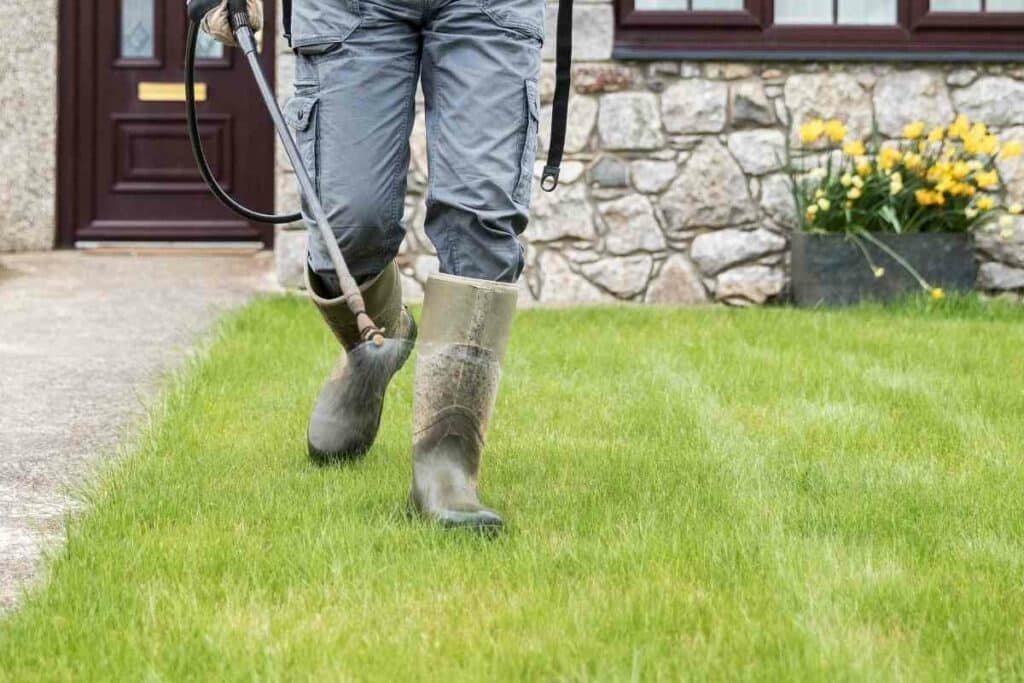
If your grass is looking a little on the yellow side, it could be lacking in chlorophyll and, by giving it an iron boost with Ironite, you’ll increase the production of chlorophyll which will make it greener.
The seasons also affect a plant’s ability to absorb nutrients from the soil. Additionally, turf grass roots cannot absorb the type of iron that is often found in the soil.
In the Springtime – Absorbable iron is not always readily available as cooler soil temperatures suppress its availability. As a result, applying Ironite in the early spring is ideal.
In addition, spring is when most turfgrass varieties have their peak growing season.
Adding Ironite will help with sufficient chlorophyll synthesis which will consequently lead to sufficient photosynthesis.
Ironite benefits
Versatile
Ironite is extremely popular with lawn experts. Its speedy action helps restore lawns to a lush appearance which is easy to maintain.
Ironite is also a good all-round product for other plants that grow on your lawn such as trees and shrubs.
The ingredients in Ironite also help to balance the soil’s pH.
Reduced Watering
Aside from the versatility of Ironite, it also reduces your lawn’s need for watering.
This is because the grass (and plants) has the perfect balance of nutrients and so don’t need to try to absorb as much from the soil as they did previously.
Diverse
The beauty and simplicity of Ironite is that it works on pretty much any soil without the need for asking experts for advice on your particular soil type.
Ironite’s formula is great for most types of soil as it’s been cleverly engineered.
It can also be applied to soil in many different climates and weather conditions as its effectiveness is not easily affected by changes in temperature or rainfall.
Nutrition
Ironite’s formula is perfectly balanced with some nutrients that are slow-release and others that are quick-release.
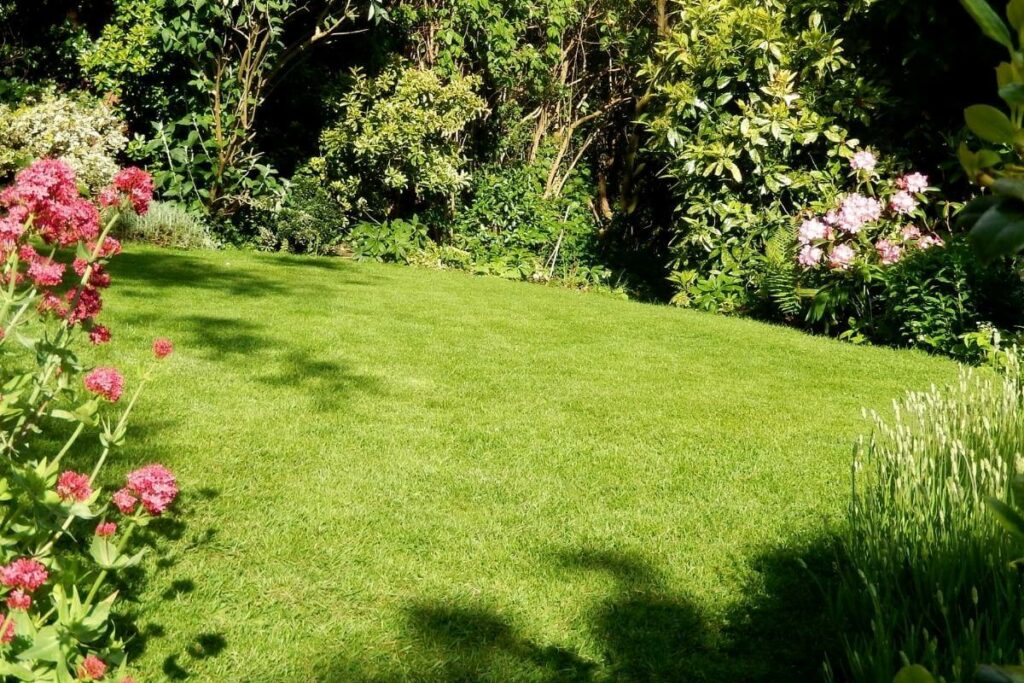
This means that the soil isn’t scorched or overfed when you first apply it.
As long as you follow the instructions, you should not scorch or overfeed your soil due to too much nitrogen (as happens with other fertilizers).
Are there any drawbacks when using Ironite?
Ironite is a great choice to nourish your lawn.
You can’t argue with that! However, there are a couple of drawbacks that we’ve already touched on.
Ironite Stains! Particularly if you use liquid Ironite. If you’ve got a nice, new sidewalk or paving, it might be best to steer clear of using Ironite as the last thing you want is a permanent stain.
However, that’s pretty much the only drawback.
Are there alternatives to Ironite?
We know by now just how great Ironite is to use for the optimal health of your lawn.
Nevertheless, there may be a time when you want to consider an alternative. Regardless of the product, using iron on a lawn is never a bad decision.
Another popular lawn supplement is Dr. Iron. This product is a great alternative to Ironite and has the bonus of not staining concrete.
It also contains 22% iron and works just as well as Ironite (or better on some lawns). It also mixes well with other products such as Milogranite.
Is using Ironite worth the cost?
You will never regret using an iron supplement such as Ironite or Dr. Iron on your lawn (unless you’re not careful and you accidentally stain your stonework!).
If you want your lawn to look the best it possibly can and be the envy of all your neighbors, making the investment to improve your lawn by using Ironite is definitely worth the cost.

If money’s a little on the tight side, you could always apply Ironite for special occasions rather than all year round.
If you’re having a big party at your house and are expecting lots of guests, applying Ironite a week before will make sure your lawn is looking at its best.
Otherwise – Using Ironite in the summer months when the grass is browner or turning a yellowish hue would be the best time to use it if money is tight.
Applying Ironite and fertilizer together
As mentioned, you can fertilize your lawn at the same time as applying Ironite.
Ironite is a fertilizer supplement that releases slowly so applying a quick-release nitrogen-based fertilizer at the same time is a great idea.
By doing this, the grass benefits from the quick boost of nitrogen and then continues to be fed by the Ironite much more slowly.
This will keep your lawn looking its best until it’s the next time to fertilize it.
Final Thoughts of Ironite for Lawns
We all want the best-looking lawn.
Green lawns are almost like a silent competition among neighbors.
If you’re looking to turn your neighbors green with envy over the color of your lawn, you can’t go wrong with Ironite.
Instead of thinking the grass is greener over the other side of the street, you’ll soon find the neighbors flocking to your door to ask you for tips!
